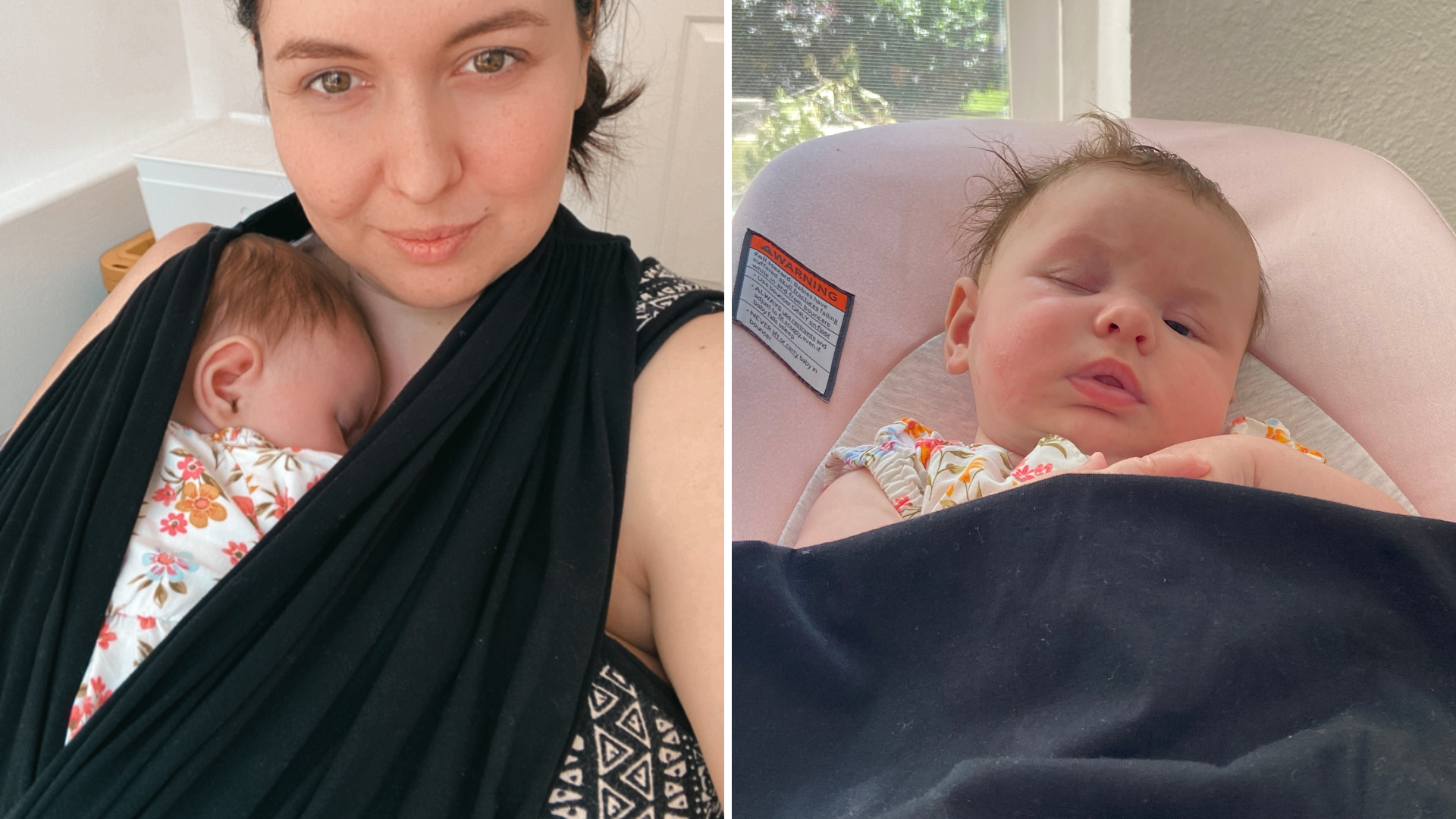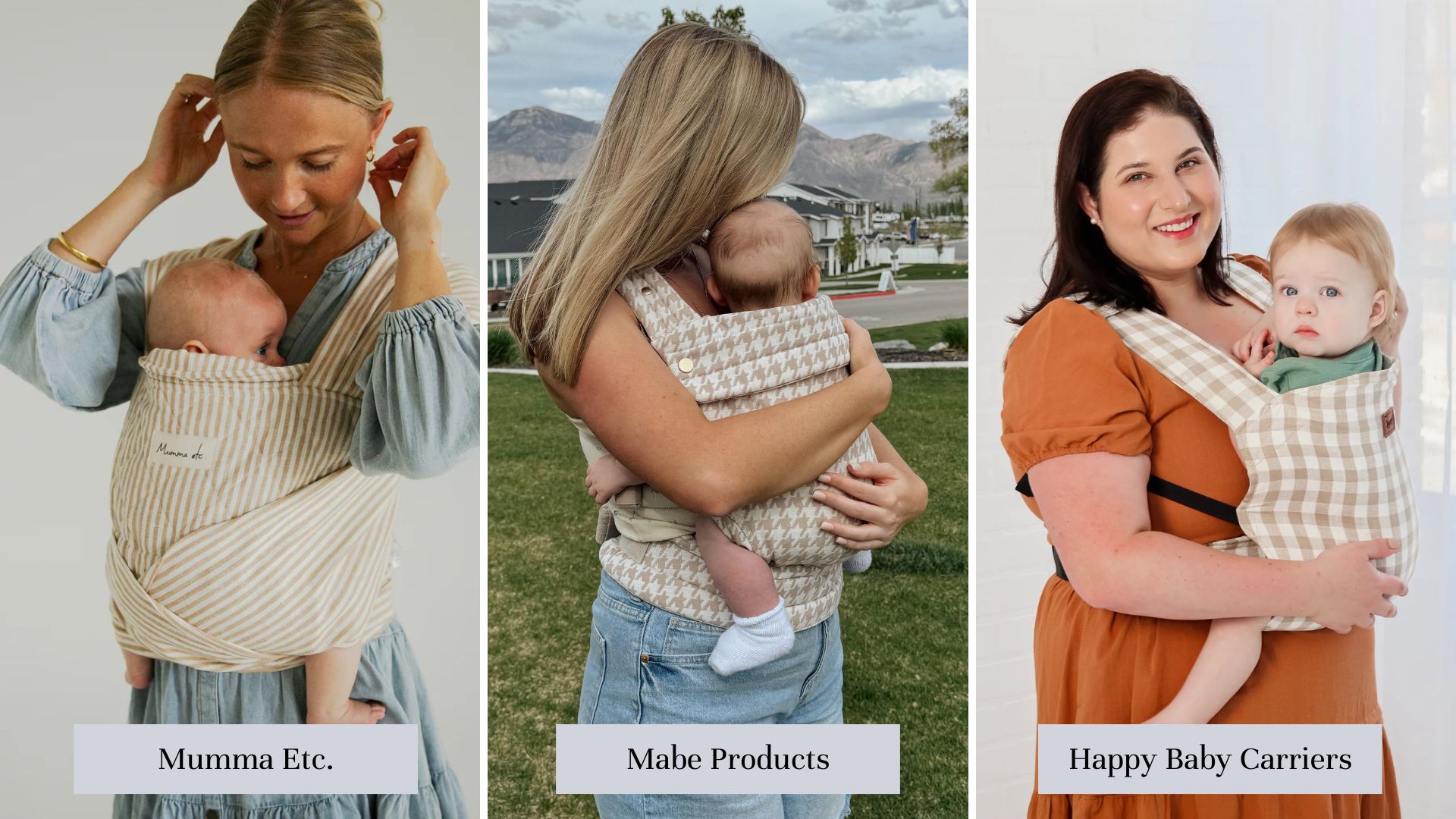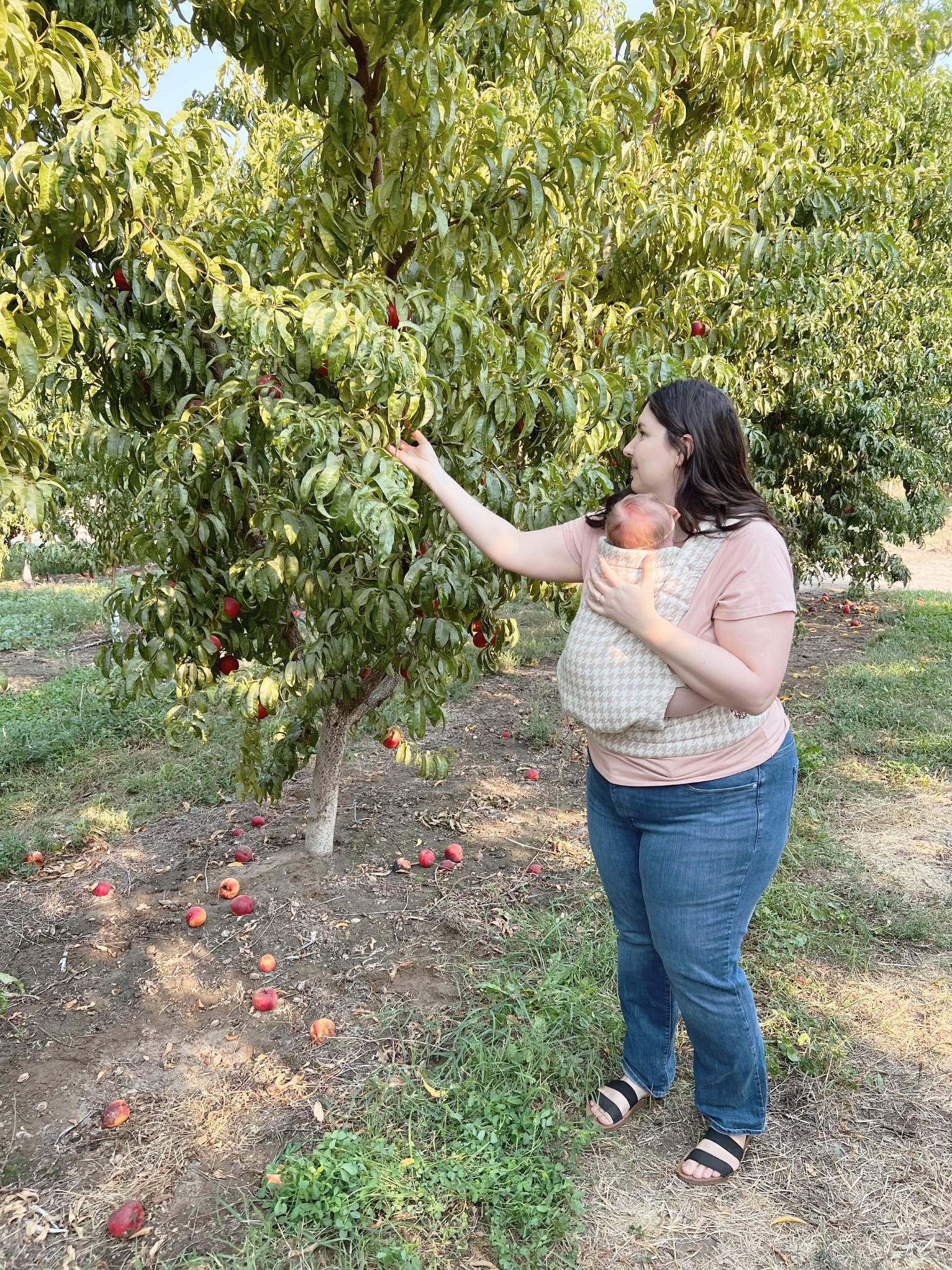Intro:
I can’t believe I’m already on baby #2! Time goes so fast and our firstborn is already a little toddler. When I had Haley (our firstborn) my toxic-free journey started. After realizing how bad the ingredients were in the formula they gave us at the hospital, I started researching everything. I was so naive to think the FDA was looking out for our health and quickly learned how bad ingredients are in our foods, leaning products, clothes, etc. I wanted to choose better for my little babies so I started this journey of clean living, one item at a time.
Next on my research is baby carriers! While I loved the functionality of the Konny Carrier with my last baby, I realized they had manmade fibers in them, the worst being polyester. Fun fact, I went to school for Apparel Merchandize & Management so I learned about fabrics and the science behind them. I knew from then that polyester was a type of plastic and not a natural fiber but didn’t know until later how bad that could be for our health, especially if we sweat in it. Unfortunately, Haley did sweat in the carrier when she fell asleep in it. I remember thinking it was funny at the time and took a photo of her but I’m definitely concerned about polyester this time around.

The Reason Polyester is Bad
Synthetic fibers were invented in the 20s when the demand for textiles went up and couldn’t keep up with natural fibers like wool and cotton. By the 50s polyester was commercialized and widely used in fabrics. The beneficial properties of polyester is durability, wrinkle resistant, stain resistant, affordability, and versatility of being combined with other fibers. While this is all great, the negative characteristics make me question if I should have it in our household.
Chemical Exposure
The main negative of polyester is the chemicals and dyes involved to make it. The production of polyester involves the use of the following harmful chemicals; antimony, phthalates, and formaldehyde. If the polyester is dyed or processed, it can also include colorants, flame retardants, and water repellents. All of these can be absorbed by the skin while wearing them, especially if you don’t wash the garment before putting it on for the first time.
Potential Health Impacts
- Skin Irritation and Allergies: Some people may develop contact dermatitis or allergic reactions to the chemicals used in polyester fabrics. Symptoms can include redness, itching, and rash.
- Endocrine Disruption: Certain chemicals used in the production of polyester, such as phthalates, are known endocrine disruptors. These substances can interfere with hormone function and have been linked to various health issues, including reproductive problems and developmental abnormalities.
- Long-Term Exposure Risks: Prolonged exposure to the chemicals in polyester fabrics may contribute to chronic health conditions, particularly if these chemicals are absorbed through the skin. However, the extent of absorption and the associated health risks are still subjects of ongoing research.
Terrible In Heat
Since polyester does not breathe as well as natural fibers, it can also trap heat and release chemicals faster. Similar to leaving a bottle of water in the hot car leaks plastics into the water. It also can melt if exposed to high heat and is extremely flammable.
I don’t know about you, but this is not something that should be in BABY carriers. I don’t want these chemicals to be absorbed by my little girl so I’ve been on the hunt for a better option.
Why Natural Fibers are Great
While it can be more expensive and harder to find, natural fiber fabrics are better for the following reasons:
1. Breathability
- Moisture Management: Natural fibers generally have better moisture-wicking properties, meaning they can absorb and release moisture more effectively. This helps keep the skin dry and prevents the growth of bacteria and fungi, which can cause skin irritation and infections.
- Airflow: Natural fibers allow better air circulation, which helps regulate body temperature and keeps you cooler in hot weather.
2. Hypoallergenic Properties
- Reduced Irritation: Natural fibers are less likely to cause skin irritation or allergic reactions compared to synthetic fibers. They are gentler on the skin and less likely to contain or retain harmful chemicals used in the manufacturing process.
3. Biodegradability
- Environmental Impact: Natural fibers are biodegradable and decompose more easily than synthetic fibers, which are derived from petroleum products and can take hundreds of years to break down. This makes natural fibers more environmentally friendly and reduces long-term exposure to pollutants.
4. Chemical Treatment
- Fewer Chemicals: Natural fibers often require fewer chemical treatments during production. For example, organic cotton is grown without the use of synthetic pesticides and fertilizers, reducing the risk of chemical residues on the fabric.
- Safer Dyes: Natural fibers can be dyed using natural dyes, which are less likely to contain harmful substances compared to synthetic dyes used on synthetic fibers.
5. Comfort
- Softness and Comfort: Natural fibers tend to be softer and more comfortable to wear, especially for individuals with sensitive skin. The texture of natural fibers can be more pleasant against the skin, reducing the risk of friction and irritation.
6. Thermoregulation
- Temperature Control: Natural fibers have excellent insulating properties. Wool, for example, can keep you warm in cold weather and cool in warm weather due to its natural crimp and ability to trap air.
7. Static Resistance
- Lower Static Electricity: Natural fibers are less likely to generate static electricity compared to synthetic fibers. This reduces the discomfort associated with static cling and the risk of static-induced skin irritation.
Choosing a Natural Fiber Baby Carriers
Now that we know natural fibers are better, the question is which one should we choose? Here’s a breakdown:
1. Cotton
- Breathability: Cotton is highly breathable, making it comfortable for both the baby and the wearer.
- Softness: It’s gentle on the baby’s sensitive skin and provides a soft, cozy environment.
- Durability: Cotton is strong and can withstand regular washing and use.
- Ease of Care: It is machine washable, making it easy to maintain.
2. Linen
- Strength: Linen is incredibly durable and can support the weight of a baby well.
- Breathability: It has excellent breathability, keeping both the baby and the wearer cool in warm weather.
- Natural Cooling: Linen naturally cools as it absorbs moisture, making it ideal for hot climates.
- Softening Over Time: While linen can be slightly stiff at first, it softens with each wash and use.
3. Hemp
- Durability: Hemp is one of the strongest natural fibers, making it very durable and long-lasting.
- Support: Provides excellent support for carrying heavier babies.
- Breathability: Like linen, hemp is breathable and cool, making it comfortable for both baby and wearer.
- Eco-Friendly: Hemp is a sustainable crop, often grown without pesticides.
4. Bamboo
- Softness: Bamboo fabric is incredibly soft, often compared to silk, making it gentle on a baby’s skin.
- Breathability: Bamboo is highly breathable and moisture-wicking, keeping the baby comfortable in various temperatures.
- Antibacterial Properties: Naturally antibacterial and hypoallergenic, which is beneficial for babies with sensitive skin.
5. Wool
- Temperature Regulation: Wool is excellent at regulating temperature, keeping the baby warm in winter and cool in summer.
- Moisture-Wicking: Wool can absorb moisture away from the skin, keeping the baby dry.
- Softness: High-quality, finely processed wool can be very soft and comfortable against the baby’s skin.
Factors to Consider
- Climate: For hot climates, breathable fabrics like cotton, linen, and bamboo are ideal. For cooler climates, wool can provide added warmth.
- Baby’s Skin Sensitivity: Choose hypoallergenic and soft materials if your baby has sensitive skin.
- Carrier Type: Different types of carriers (wraps, slings, structured carriers) may benefit from different materials. For example, stretchy wraps often use cotton or bamboo, while structured carriers might combine materials for added strength and support.
My personal Choice for a Baby Carrier is Linen or Cotton
I believe linen and cotton are the best balance of breathability and strength to support the baby. Plus, we’re going to have baby 2 in the high heat of summers (talking over 100 degree weather) so breathability is one of our top requirements. While there are endless options out there for natural carriers, I’ve narrowed it down to these three based on mom recommendations from Facebook groups:
- Mumma Etc. – Burleigh Wrap Carrier $170
- Mabe Products – Houndsooth Monarch Carrier $120
- Happy Baby Carriers – Prarie Original Baby Carrier $169

Besides the fabric choice, I was looking for something under $200. Tbh, I was hoping it would cost more around $40 but that doesn’t seem to be the case. I was also hoping to make my own since I have linen fabric and previous experience sewing but I had no luck finding a pattern. I know how important it is to make it ergonomic for the baby too so I don’t feel comfortable guessing on the shape. Maybe one day, after I have one to use as a model, I’ll attempt that.
Lastly, I don’t want a bulky one since I had the Ergo Baby Omni carrier and that one felt so bulky.
I’m honestly torn between these three, they all seem great! I also love their neutral colors and patterns. Which one is YOUR favorite?
** Update, I ended up getting the Mabe Products one and LOVE it! It’s sooo nice and I was even able to wash it in the machine on cold. That’s super convenient.
